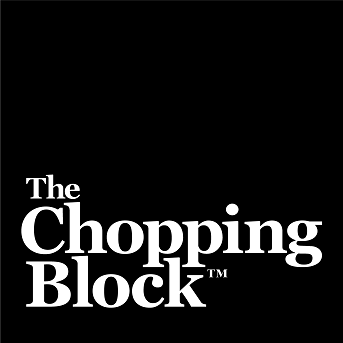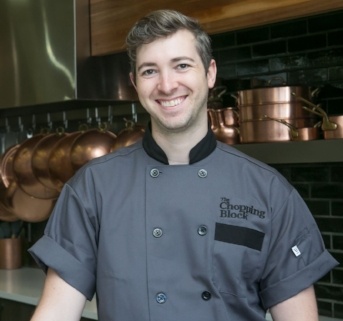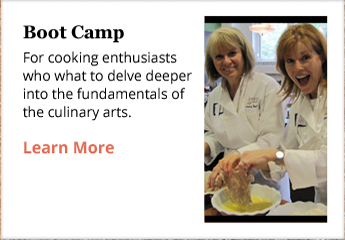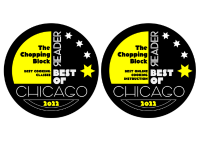When you work as a cook in a restaurant, getting food from raw ingredients to finished dishes can, in some ways, be more straightforward than cooking at home, or less, depending on your point of view. Very rarely in a restaurant setting is something cooked from raw, and then immediately plated up and served to a guest. The main exception to this would be proteins, but even then most restaurants will get your steak or chicken or what-have-you at least part of the way toward finished before it's even ordered.
 This means that, as I mentioned in my previous blog on this topic, prep is really where most of the cooking for a restaurant gets done. The less the line cooks need to do from scratch during service the better. In my last post, however, I took you in depth into a single prep task for the day. The idea there was to give a sense of the way in which prepping for a restaurant service differs from cooking at home.
This means that, as I mentioned in my previous blog on this topic, prep is really where most of the cooking for a restaurant gets done. The less the line cooks need to do from scratch during service the better. In my last post, however, I took you in depth into a single prep task for the day. The idea there was to give a sense of the way in which prepping for a restaurant service differs from cooking at home.
In this post I want to take a different, almost opposite approach. Rather than go in depth on a single prep task, I want to give you a sense of what its like to go through an entire AM prep shift getting ready for dinner service. I'll show you (more or less) all the tasks I completed in one shift, but will largely leave out the details of the individual tasks themselves. Also, in this context AM really just means ‘pre-service’ as my day ends at 5:00 PM.
Similarly to the last post, I'll mostly let the photos do the talking with just brief interjections explaining what's going on in the images.
Not pictured is the routine I go through when I get in before even starting to cook. This includes reading through the prep list to prioritize my day, lighting the pilots on the equipment (I typically only need to do this at the start of the week), feeding the sourdough starter, moving the cleaning equipment from the previous service outside of the kitchen, setting up the dish area, and setting up my station for the day.
My first task of the day was to prepare the filling for the leek and gruyere tart. This involves trimming, cleaning, slicing, and sweating leeks in butter, then chilling them while I grate gruyere cheese, and prepare the custard. Here is the filling (sans custard) all finished.
 Next, I made the mise en place for the beef tartare. This is basically all the flavorings that go into the dish so that all the line cooks need to do is mix it together and season. Not all tartare is the same, but in this case it brunoised shallots, minced capers and cornichon, bound together with smooth and grainy Dijon mustard.
Next, I made the mise en place for the beef tartare. This is basically all the flavorings that go into the dish so that all the line cooks need to do is mix it together and season. Not all tartare is the same, but in this case it brunoised shallots, minced capers and cornichon, bound together with smooth and grainy Dijon mustard.


 After this, I started to prepare the braised endive. Here I trim and halve Belgian endive, then sear them in a hot pan before adding garlic, onion, white wine, and very gelatinous chicken stock. I move the seared endive to a hotel pan, then reduce the liquid and aromatics down to almost a glazing consistency before braising in a hot oven for 20 minutes. Before and after it comes out of the oven, the endive is basted with the cooking liquid.
After this, I started to prepare the braised endive. Here I trim and halve Belgian endive, then sear them in a hot pan before adding garlic, onion, white wine, and very gelatinous chicken stock. I move the seared endive to a hotel pan, then reduce the liquid and aromatics down to almost a glazing consistency before braising in a hot oven for 20 minutes. Before and after it comes out of the oven, the endive is basted with the cooking liquid.



While the endives are braising, I move on to cleaning and cutting radishes. These are served raw so they need to be meticulously cleaned to get ready for service. This job is a bit tedious and can take a while to get the amount we need, so I have to multitask.


 To be a good prep cook, you should always be aware of what else is happening in the kitchen. If your sous chef’s fried shallots need a stir, just stir them.
To be a good prep cook, you should always be aware of what else is happening in the kitchen. If your sous chef’s fried shallots need a stir, just stir them.
 The endive finished braising and came out of the oven, got flipped and glazed one last time.
The endive finished braising and came out of the oven, got flipped and glazed one last time.
 Remember, dear reader, even a dull knife is sharp enough to cut you.
Remember, dear reader, even a dull knife is sharp enough to cut you.
 In order for potato rolls (our bread service for this evening) to be baked in time for service, I have to start cooking the potatoes now.
In order for potato rolls (our bread service for this evening) to be baked in time for service, I have to start cooking the potatoes now.
 After they are done boiling, they get lightly mashed then mixed into the roll dough.
After they are done boiling, they get lightly mashed then mixed into the roll dough.
 Then it's back to radishes
Then it's back to radishes
 Finally all cleaned, sliced, and packed away for service.
Finally all cleaned, sliced, and packed away for service.
After I got the radishes squared away, it was time to divide and shape the potato rolls and get them proofing before their bake.

Then I cleaned, steamed, and picked a couple bags of mussels, stored them in brine, then divided them up among about 40 kits for service.




From here, I diced butter for service, then trimmed, chopped, blanched, and pureed some zucchini to finish out the gnocchi mise en place.


 While all this was happening, it was also time to bake the rolls.
While all this was happening, it was also time to bake the rolls.
 And that was about it. There are about a million other small things that get done throughout the day to make sure everything is on track, but that is the bulk of one day. Hopefully this gave you some insight into what it's like to cook professionally in a real restaurant kitchen, and if it inspired you to up your personal prep game there is no class more suited to that than one of our upcoming knife skills classes.
And that was about it. There are about a million other small things that get done throughout the day to make sure everything is on track, but that is the bulk of one day. Hopefully this gave you some insight into what it's like to cook professionally in a real restaurant kitchen, and if it inspired you to up your personal prep game there is no class more suited to that than one of our upcoming knife skills classes.











